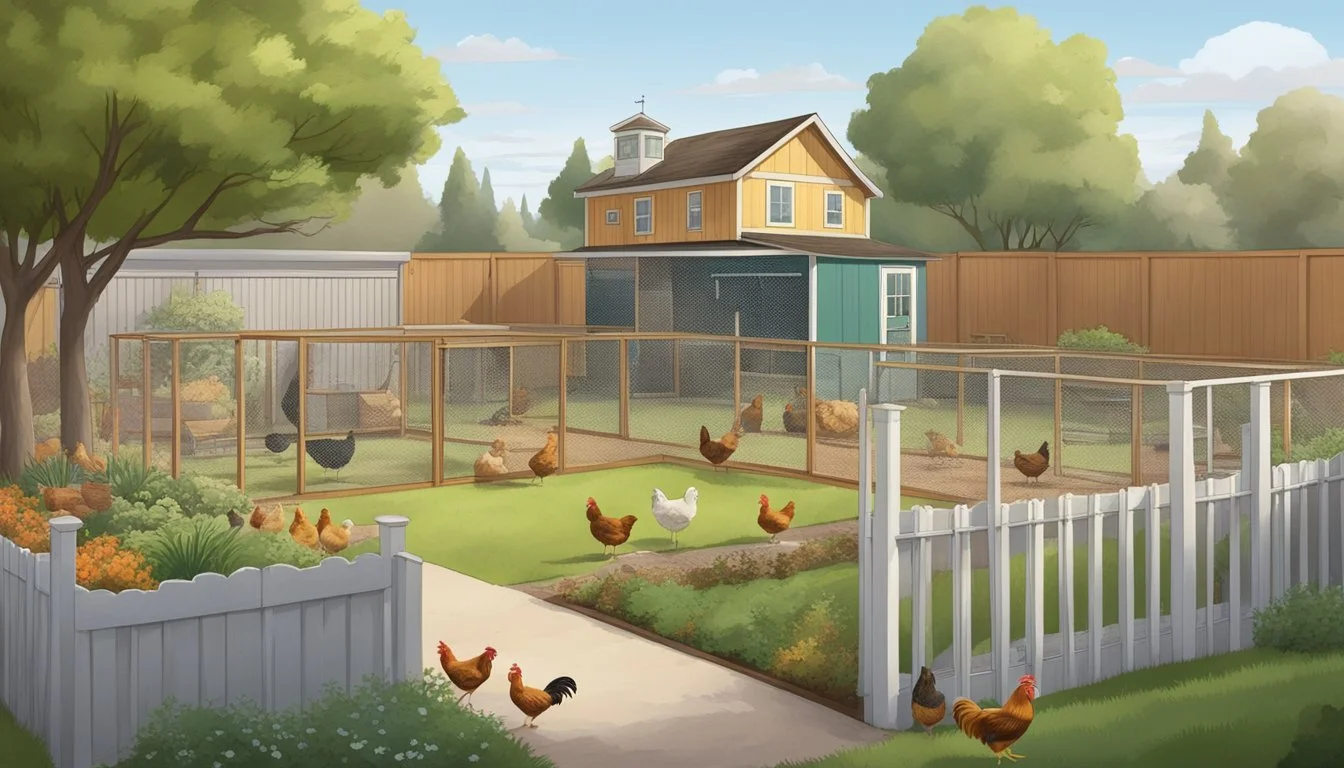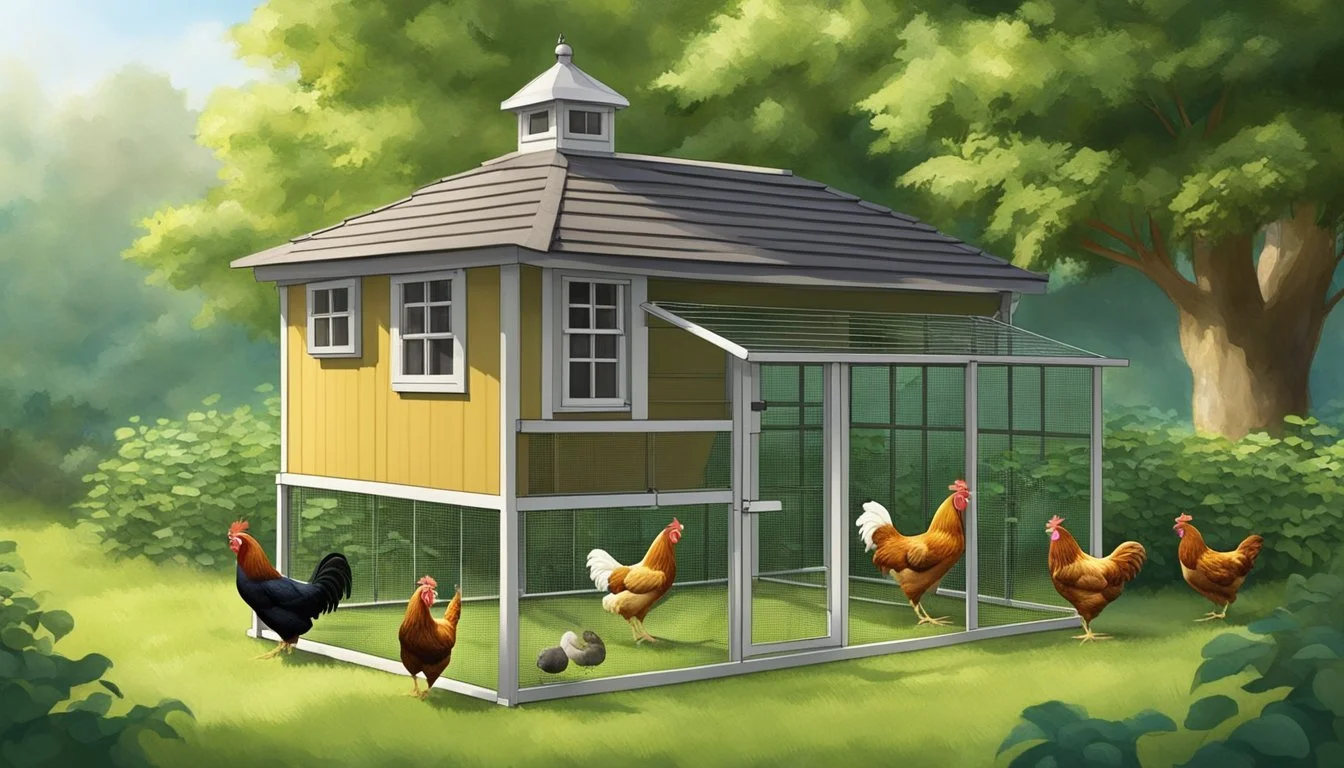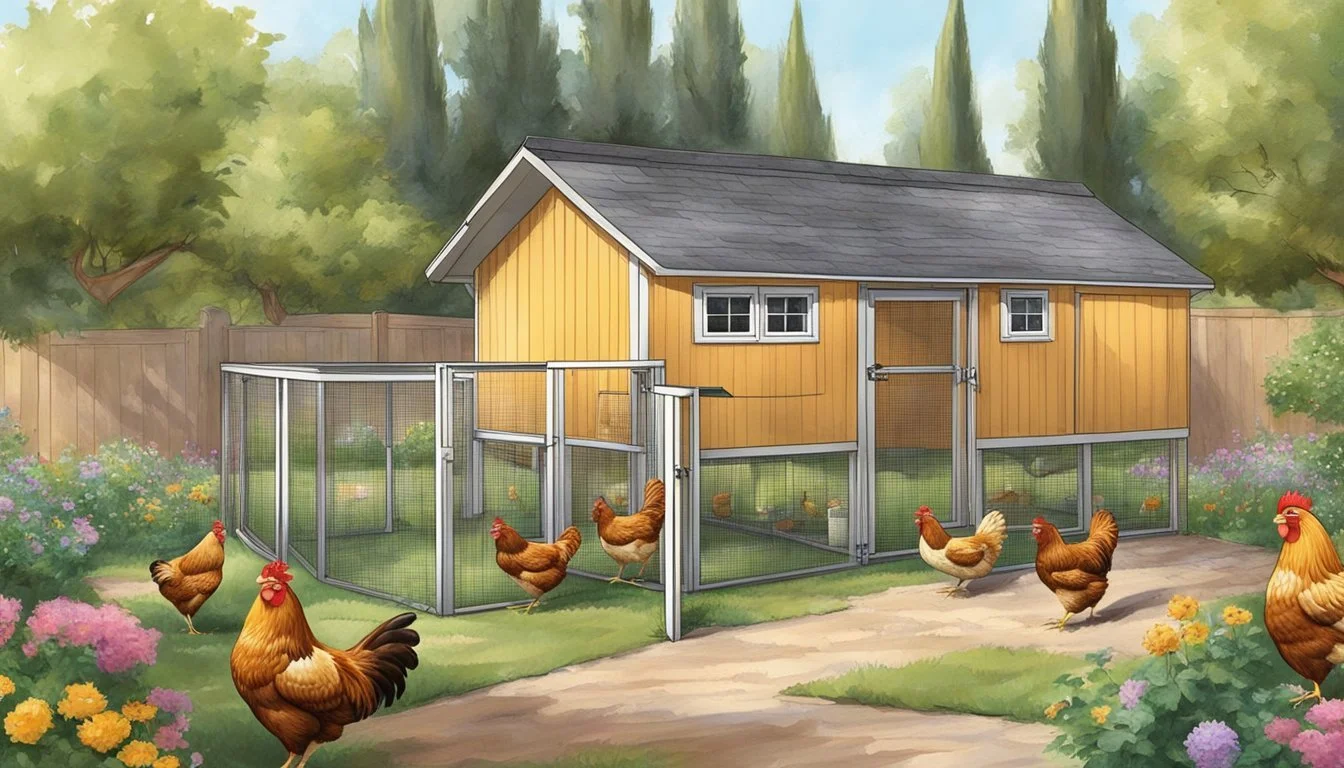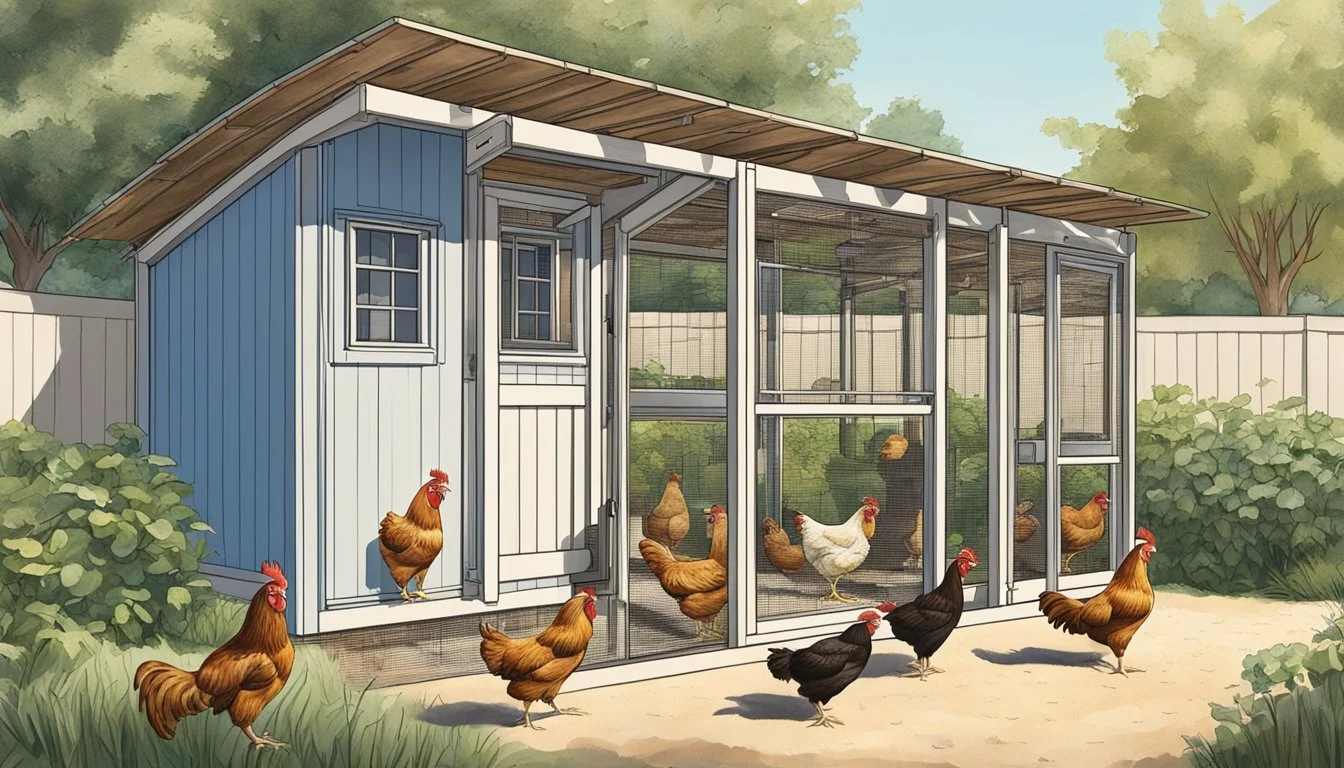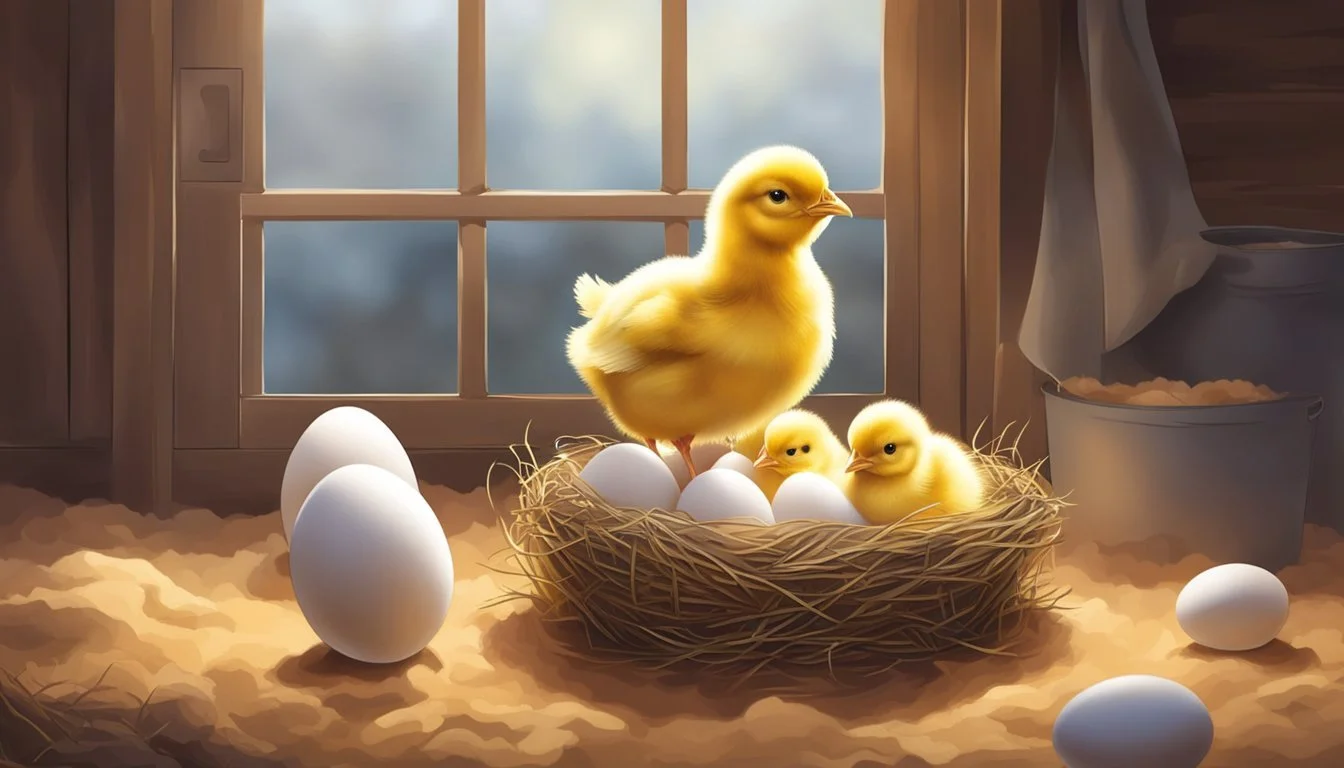Raising Backyard Chickens in Davis, CA
Your Ultimate Guide to Urban Poultry
Raising backyard chickens has become an increasingly popular practice in urban areas, and Davis, California, is no exception. With the city's favorable Chicken Ordinance, residents can keep a limited number of hens, allowing for a sustainable source of fresh eggs and the joy of caring for these animals. The ordinance stipulates that households may not have more than six hens, with the combined total of these and other allowed animals not exceeding six. It’s an activity that blends agricultural tradition with suburban life, offering an educational experience on animal husbandry and food production.
In Davis, those interested in starting their own flock must consider several factors to ensure they meet the regulations and maintain the health of their chickens. The city's ordinance is designed to manage urban livestock's impact on the community, requiring considerations for coop placement, noise control, and the mitigation of other potential nuisances. It is crucial for aspiring poultry keepers in Davis to be well-informed on these guidelines and adopt best practices for raising healthy chickens.
Proper care in raising backyard chickens includes understanding their dietary needs, providing adequate space, and ensuring shelter from predators and harsh weather. A routine that involves checking the coop twice daily for eggs will help maintain the freshness and safety of the harvest. With UC Davis offering resources on poultry care and even developing apps to assist residents, guidance is readily available. By being responsible and informed, residents of Davis can enjoy the benefits of raising chickens right in their backyards.
Understanding Local Chicken Ordinances in Davis
When raising backyard chickens in Davis, California, it is essential for residents to be aware of both state and local regulations that govern the keeping of poultry. Adhering to these regulations ensures legal compliance and neighborhood harmony.
Navigating California State Poultry Laws
In California, state laws set a framework for poultry keeping, which local ordinances further refine. It is important for potential chicken owners to familiarize themselves with state-wide regulations that affect all poultry keepers. These include health and safety codes, as well as animal welfare laws designed to protect the birds. One must always check for updates to state laws to ensure ongoing compliance.
Davis City Backyard Chicken Regulations
The City of Davis has specific ordinances that residents must follow when considering backyard chicken farming. A person residing within city limits can keep a maximum of six hens. No roosters are allowed, to mitigate noise issues. The regulations also specify that coops and poultry enclosures must be kept clean and are subject to property line setback requirements to reduce any potential nuisances to neighbors.
Key points from the Davis Municipal Code:
Maximum of six hens allowed
No roosters permitted
Enclosures must adhere to setback requirements
Permit Requirements and Restrictions
Residents must be cognizant of any permit requirements that Davis imposes for the keeping of backyard chickens. While the search results did not specify permit details, municipalities often require a permit or a one-time registration fee to legally raise chickens. Restrictions typically cover the number of animals, enclosure specifications, and maintenance standards to ensure public health and animal welfare are not compromised.
It is advisable for anyone considering raising backyard chickens in Davis, CA, to contact the City Manager's Office for the most current information regarding permits and detailed regulations:
Contact Information City Manager's Office Phone: (530) 757-5602 Address: 23 Russell Blvd, Davis, CA 95616
By understanding and adhering to these state and local laws, residents can enjoy the benefits of raising backyard chickens without legal complications.
Choosing the Right Chicken Breeds
Selecting the ideal chicken breed for a backyard in Davis, California involves considering the climate, egg production needs, and the character of the chickens.
Factors Influencing Breed Selection
When one is picking chicken breeds for a backyard in Davis, the local climate plays a significant role. Davis experiences hot summers and mild winters, so breeds that thrive in warm weather and can tolerate temperature fluctuations are necessary. Additionally, space constraints within backyard premises should influence the size of the breeds one chooses — bantam varieties are suitable for more compact spaces.
Egg Production: For enthusiasts eager to collect eggs, breeds with higher laying capacities are preferable. The desired egg color may also steer their choices, as certain breeds lay eggs with unique hues.
Popular Chicken Breeds for Backyards
Several breeds fit well within the parameters of backyard chicken keeping in a Californian climate like that of Davis:
Australorps: Known for their high egg production with hens laying up to 5-6 eggs per week, they are also tolerant of both heat and mild cold, making them an excellent choice for Davis’s varied climate.
Orpingtons: These birds are friendly and do well in confined spaces, making them optimal for smaller yards. Their fluffy feathers provide some heat resistance.
Leghorns: If white eggs are the goal, they are prolific layers of such and can handle the heat well.
Silkies: Although not high egg producers, these bantams are ideal for limited spaces and are heat-tolerant as well.
Here is a simplified table summarizing the breeds:
Breed Egg Production Heat Tolerance Egg Color Size Australorp High Good Brown Large Orpington Moderate Moderate Brown Large Leghorn High Excellent White Large Silkie Low Good Cream Bantam
One must consider these factors carefully to ensure that their chicken-keeping experience in Davis, California is both successful and enjoyable.
Designing and Constructing Your Chicken Coop
When planning a chicken coop in Davis, CA, one must consider local regulations and specific design features to create a safe and comfortable environment for the chickens.
Assessing Space and Location
A critical first step is to assess the available space for a chicken coop, ensuring there is adequate room for the chickens to roam, feed, and rest. The coop should be positioned a considerate distance from neighboring residences to minimize noise and odor concerns. In choosing a location, one should look for:
High ground to avoid flooding issues
Sunlight access for warmth and disinfection
Shade areas to protect from extreme heat
Easy access for cleaning and maintenance
Essential Features of a Safe Coop
A well-designed coop will protect chickens from weather and predators while providing a clean environment for them to live in. Key features include:
Ample ventilation: Essential for maintaining air quality
Sturdy construction: To deter predators
Insulation: To guard against temperature extremes
Easy to clean: Surfaces and layout promoting hygiene
Perches and nesting areas: For natural behaviors and egg-laying
The design should integrate both a secured enclosed space and an outdoor run. The enclosed coop is where chickens will spend nights and lay eggs, whereas the outdoor run allows them space during the day to exhibit natural behaviors. Adequate space per chicken is vital to prevent overcrowding, which can lead to stress and disease. In Davis, CA, it is also wise to design the coop with prevention from local wildlife in mind, reinforcing against potential threats such as raccoons and birds of prey.
Raising Healthy Chickens
Raising healthy backyard chickens in Davis, CA requires attention to disease prevention and regular health checks. By following best practices, one can ensure their chickens maintain optimal health, reducing the risk of disease and promoting a clean environment.
Preventing and Identifying Common Diseases
Prevention: Maintaining a clean coop is crucial to prevent the spread of bacteria and diseases such as salmonella. It is recommended to:
Routinely clean and disinfect the coop.
Provide fresh, clean water and high-quality feed.
Practice biosecurity measures, such as limiting visitors and washing hands before and after handling chickens.
Identification: Familiarity with common symptoms of illness allows for early detection:
Lethargy, decreased appetite, or abnormal droppings may indicate illness.
Respiratory issues could suggest infectious bronchitis or Newcastle disease.
Regularly observe chickens for any signs of distress or disease.
Regular Maintenance and Health Checks
Maintenance: Consistent health checks are necessary to catch issues early on. Chicken owners should:
Inspect feathers, skin, and beak condition.
Monitor weight and growth progress for irregularities.
Check regularly for parasites like mites or lice.
Health Checks: Establishing a relationship with a local veterinarian who has experience with poultry is beneficial. They can:
Provide vaccinations, when necessary, to protect against common diseases.
Offer advice on nutritional needs and preventive care.
Assist with disease diagnosis and treatment plans.
By adhering to these guidelines, one can provide a safe and healthy environment for their backyard chickens, ensuring they thrive and produce effectively.
Daily Care and Feeding
Consistent, attentive care ensures that backyard chickens in Davis, CA lead healthy, productive lives. A precise focus on nutritional needs and maintaining hygiene in water and food practices is fundamental.
Nutritional Needs of Backyard Chickens
Backyard chickens require a balanced diet comprising proteins, carbohydrates, vitamins, and minerals. Layer feed is essential for egg-laying hens, as it contains the necessary calcium for shell formation. Typically, a mature hen consumes about a quarter pound of feed daily. Here's a basic dietary composition for laying hens:
Calcium: 3-4%
Phosphorus: 0.45%
Crude Fiber: 5%
Chickens also benefit from kitchen scraps and garden produce but avoid giving them anything moldy, salty, or fatty. Occasional treats like mealworms can be given, but they should not constitute more than 10% of their diet.
Clean Water and Food Practices
Chickens need constant access to clean water. Water containers must be scrubbed and refilled daily to prevent algae and bacterial growth. It's recommended to use waterers designed to stay clean, like nipple systems or those with guards to keep out debris.
For food practices, adhere to the following guidelines:
Store feed in a cool, dry place to prevent mold.
Use feeders that protect food from droppings and debris.
Remove leftover food to deter pests.
Regularly clean feeders with soapy water.
Collecting eggs twice a day reduces the chances of them getting dirty or damaged. Once collected, eggs should be washed with water warmer than the egg's temperature and immediately refrigerated.
Protecting Chickens from Predators and Pests
Raising chickens in Davis, CA requires proactive measures against a range of predators and pests. Effective strategies must be implemented to secure both the chicken run and coop, as well as to manage rodents and other pests that could harm the chickens or spread disease.
Securing the Chicken Run and Coop
The chicken run and coop are the first lines of defense against predators such as raccoons, foxes, and even domestic dogs. They should be fortified to prevent any breaches.
Use Hardware Cloth: For all openings in the coop, one should install 1/2 inch hardware cloth rather than chicken wire. Hardware cloth is more durable and provides better protection from predators that can rip through less sturdy materials.
Cover the Run: A secure cover over the chicken run can protect against aerial and climbing predators. Using a combination of solid roofing or hardware cloth is more effective than netting alone.
Bury the Fencing: To prevent digging predators, fencing should extend below ground level. An outward angled apron of hardware cloth can also be buried around the perimeter to deter burrowing animals.
Install an Electric Fence: An electric fence or electronet around the chicken run can serve as a powerful deterrent and protective barrier, particularly when energized by a solar charger.
Rodent and Pest Control
Aside from larger predators, rodents and smaller pests can be a significant problem, not only by preying on eggs or young chicks but also by spreading parasites and disease.
Secure Feed Storage: Rodents are primarily attracted to chicken feed. Storage should be in rodent-proof containers, made of metal with tight-fitting lids.
Regular Cleaning: The coop should be kept clean to discourage rodents. Regular removal of leftover food, cleaning of droppings, and disposal of any garbage or clutter eliminates hiding and breeding spots for pests.
Natural Deterrents: Cats and certain breeds of dogs can help keep rodent populations under control. They must be trained not to harm the chickens themselves.
Traps and Baits: If rodents become a problem, strategically placed traps and baits outside the coop can help reduce their numbers. Care should be taken to place these where chickens cannot access them.
The Process of Hatching Eggs at Home
Raising backyard chickens in Davis, CA, begins with the successful hatching of eggs. Grasping the nuances of incubation and the subsequent care of baby chicks is essential for a fruitful endeavor.
Incubation Essentials
Temperature and Humidity: Incubators must be pre-heated to a stable 99.5°F (37.5°C) and set to a 50-60% humidity level for the first 18 days. In the three days leading up to hatching, humidity should be increased to 65-75%.
Turning the Eggs: Eggs require turning 3 to 5 times daily for uniform heat distribution.
Ventilation: Sufficient air exchange inside the incubator is vital for chick development.
Table 1: Incubation Parameters
Parameter Days 1-18 Days 19-21 Temperature 99.5°F (37.5°C) 99.5°F (37.5°C) Humidity 50-60% 65-75% Egg Turning 3-5 times daily None (Stop turning)
Caring for Baby Chicks
Once chicks hatch, they require a warm and safe environment to thrive.
Temperature: A brooding area should be at 95°F for the first week, decreasing by 5°F each week until reaching outdoor temperature.
Feeding: Provide starter feed formulated specifically for baby chicks.
Water: Clean, fresh water must be available at all times.
List of Essentials for Baby Chicks:
Brooding box or area
Heat source (heat lamp or plate)
Starter feed and feeders
Waterers
Bedding material (pine shavings or similar)
Raising chickens from hatching eggs at home can be a rewarding experience with proper knowledge and attentiveness to these critical first steps.
Legal and Ethical Considerations
When raising backyard chickens in Davis, CA, residents must navigate a framework of regulations regarding the number of animals and ensure their humane treatment, while also considering the impacts on neighbors and emergency response protocols.
Respecting Neighbors and Surrounding Community
In Davis, California, ordinances stipulate that individuals may keep a combination of no more than six hens; roosters are not permitted due to noise concerns. Compliance with such regulations is essential to maintain respectful relations with the surrounding community. Moreover, chicken coops should be placed at least 20 feet from any house to minimize disturbances. Residents must be mindful of:
Noise levels, especially in the early morning
Odors and waste management to prevent nuisances
Visual impact, keeping coops tidy and well-maintained
Understanding Emergency Response and Euthanasia
Residents require a clear understanding of emergency protocols related to backyard chickens. This includes recognizing signs of disease and having a plan for humane treatment and euthanasia if necessary. Guidelines include:
Prompt response to sickness or injury to prevent suffering
Contact information for local veterinarians experienced in poultry
Knowledge of local regulations regarding the disposal of deceased birds to ensure community safety and compliance with health codes
Engaging with the Chicken Owner Community
Connecting with fellow backyard chicken enthusiasts in Davis, California, allows for a richer, more supportive experience. This engagement can lead to a wealth of shared knowledge on best practices, local regulations, and optimal care for poultry.
Davis-Specific Chicken Networking
In Davis, chicken owners can tap into a local network to exchange tips and advice for raising healthy backyard chickens. The City Manager’s Office is a point of contact for new owners seeking more information about city ordinances, including the stipulation that a maximum of six hens are allowed in conjunction with other animals. Networking can be facilitated through local online forums, community centers, and events that encourage interaction among poultry enthusiasts.
Leveraging UC Davis Resources
UC Davis, through its School of Veterinary Medicine, extends valuable resources to the chicken-owning community. Dr. Maurice Pitesky, a poultry expert at UC Davis, offers insight into the care and maintenance of laying hens, including advice on the frequency of egg collection. The university has introduced a mobile app targeted at backyard chicken owners, which contains informative resources and cooperative extension services. This app is not only a tool for education but also a platform for data collection to improve the health and welfare of chicken flocks in Davis. UC Davis periodically invites local chicken owners to participate in studies, offering compensation and integrating them into a broader community focused on best poultry rearing practices.
Getting Started with Backyard Chickens
Embarking on the journey of raising backyard chickens in Davis, California, begins with careful planning and preparation. They recommend individuals interested in starting their own flock to first understand the local regulations regarding the keeping of chickens to ensure compliance with city ordinances.
Choosing Your Chickens
Often, beginners start with pullets, which are young hens that have not yet begun to lay eggs. At this stage, they are typically easier to care for than chicks, as they are more resilient and require less intensive management.
Housing
Secure and comfortable housing is crucial for the well-being of chickens. A coop that provides protection from predators and extreme weather is necessary. They must have enough space to roost comfortably, as overcrowding can lead to stress and increased vulnerability to diseases.
Age Space per Chicken Under 6 weeks 0.6 sq. ft. 6-14 weeks 1-1.5 sq. ft. 14 weeks+ 2-3 sq. ft.
Feeding
Proper nutrition is vital for the health of backyard chickens. Starting from 8 to 14 weeks old, chickens benefit from a feed containing 16%-18% protein, transitioning to 16% protein finish feed as they approach the laying stage.
Maintenance
Day-to-day care involves ensuring a continuous supply of fresh water and feed, regular cleaning of the coop, and daily egg collection to prevent spoilage.
Healthcare
Regular check-ups and monitoring for any signs of illness or distress are integral components of chicken care. New keepers must also educate themselves on common chicken ailments and their corresponding treatments.
By adhering to these guidelines with a methodical and informed approach, one can confidently establish a thriving and productive backyard chicken flock in Davis, CA.


